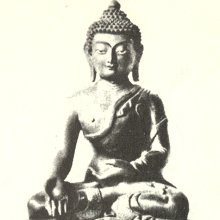Mahaprabha, Mahāprabha, Maha-prabha: 10 definitions
Introduction:
Mahaprabha means something in Hinduism, Sanskrit. If you want to know the exact meaning, history, etymology or English translation of this term then check out the descriptions on this page. Add your comment or reference to a book if you want to contribute to this summary article.
Images (photo gallery)
In Hinduism
Purana and Itihasa (epic history)
Source: archive.org: Shiva Purana - English TranslationMahāprabha (महाप्रभ) refers to “shining lustrously”, according to the Śivapurāṇa 2.3.38 (“Description of the dais or maṇḍapa”).—Accordingly, as Himavat prepared the wedding of Menā and Śiva: “[...] On the left side there were two huge saffron coloured elephants with four tusks and appearing to be of sixty years in age. They shone lustrously (mahāprabha). There were two horses too, brilliant like the sun. They were bedecked in divine ornaments and other necessary embellishments. The guardians of the quarters were shown as adorned with great gems. All the gods were portrayed by Viśvakarman realistically. [...]”.

The Purana (पुराण, purāṇas) refers to Sanskrit literature preserving ancient India’s vast cultural history, including historical legends, religious ceremonies, various arts and sciences. The eighteen mahapuranas total over 400,000 shlokas (metrical couplets) and date to at least several centuries BCE.
Languages of India and abroad
Sanskrit dictionary
Source: DDSA: The practical Sanskrit-English dictionaryMahāprabha (महाप्रभ).—a. of great lustre.
-bhaḥ the light of a lamp.
Mahāprabha is a Sanskrit compound consisting of the terms mahā and prabha (प्रभ).
Source: Cologne Digital Sanskrit Dictionaries: Edgerton Buddhist Hybrid Sanskrit DictionaryMahāprabha (महाप्रभ).—(1) name of a Buddha in the west: Sukhāvatīvyūha 97.15; (2) name of a Bodhisattva: Gaṇḍavyūha 3.15; (3) name of a king: Gaṇḍavyūha 160.15 ff.; (4) name of a kalpa: Gaṇḍavyūha 281.23; (5) (presumably nt.) name of a city: Gaṇḍavyūha 99.11.
Source: Cologne Digital Sanskrit Dictionaries: Shabda-Sagara Sanskrit-English DictionaryMahāprabha (महाप्रभ).—mfn.
(-bhaḥ-bhā-bhaṃ) Very bright, splendid. m.
(-bhaḥ) Lamp-light, the light of a lamp. E. mahā much, prabhā shining.
Source: Cologne Digital Sanskrit Dictionaries: Cappeller Sanskrit-English DictionaryMahāprabha (महाप्रभ).—[adjective] very resplendent; [feminine] prabhā great brightness.
Source: Cologne Digital Sanskrit Dictionaries: Aufrecht Catalogus CatalogorumMahāprabhā (महाप्रभा) as mentioned in Aufrecht’s Catalogus Catalogorum:—a
—[commentary] on Viśvanātha’s Siddhāntamuktāvalī, by Madhusūdana Gosvāmin.
1) Mahāprabha (महाप्रभ):—[=mahā-prabha] [from mahā > mah] mfn. shining brightly, exceedingly brilliant or splendid, [Mahābhārata; Harivaṃśa]
2) [v.s. ...] m. the light of a lamp, [Horace H. Wilson]
3) Mahāprabhā (महाप्रभा):—[=mahā-prabhā] [from mahā-prabha > mahā > mah] f. gr° brightness, [cf. Lexicographers, esp. such as amarasiṃha, halāyudha, hemacandra, etc.]
4) [v.s. ...] Name of [commentator or commentary]
5) Mahāprabha (महाप्रभ):—[=mahā-prabha] [from mahā > mah] m. Name of a Tathāgata, [Sukhāvatī-vyūha ii]
Source: Cologne Digital Sanskrit Dictionaries: Yates Sanskrit-English DictionaryMahāprabha (महाप्रभ):—[mahā-prabha] (bhaḥ) 1. m. Lamp light. a. Bright.
[Sanskrit to German]
Sanskrit, also spelled संस्कृतम् (saṃskṛtam), is an ancient language of India commonly seen as the grandmother of the Indo-European language family (even English!). Closely allied with Prakrit and Pali, Sanskrit is more exhaustive in both grammar and terms and has the most extensive collection of literature in the world, greatly surpassing its sister-languages Greek and Latin.
See also (Relevant definitions)
Partial matches: Maha, Prabha.
Starts with: Mahaprabhamandalavyuhajnanamudra, Mahaprabhasa, Mahaprabhasotpattivarnana, Mahaprabhava.
Full-text: Mahaprabhamandalavyuhajnanamudra, Madhusudana gosvamin, Avasathya, Manipura, Pratimuc, Bhashaparicheda, Karikavali.
Relevant text
Search found 5 books and stories containing Mahaprabha, Mahāprabha, Maha-prabha, Mahā-prabha, Mahāprabhā, Mahā-prabhā; (plurals include: Mahaprabhas, Mahāprabhas, prabhas, Mahāprabhās, prabhās). You can also click to the full overview containing English textual excerpts. Below are direct links for the most relevant articles:
Trishashti Shalaka Purusha Caritra (by Helen M. Johnson)
Part 18: Ninth incarnation as a god < [Chapter II - Previous births of Pārśvanātha]
Sanskrit sources of Kerala history (by Suma Parappattoli)
15. Other Mahakavyas describing Kerala < [Chapter 3 - Historical Details from Mahakavyas]
Maha Prajnaparamita Sastra (by Gelongma Karma Migme Chödrön)
Bhūmi 10: the ground of the cloud of the Dharma (dharmameghā) < [Chapter XX - (2nd series): Setting out on the Mahāyāna]
Bhūmi 1: the joyous ground (pramuditā) < [Chapter XX - (2nd series): Setting out on the Mahāyāna]
The Bhagavata Purana (by G. V. Tagare)
Chapter 12 - The Performance and Renunciation of Prescribed Karmas < [Book 11 - Eleventh Skandha]
The Brahma Purana (by G. P. Bhatt)
